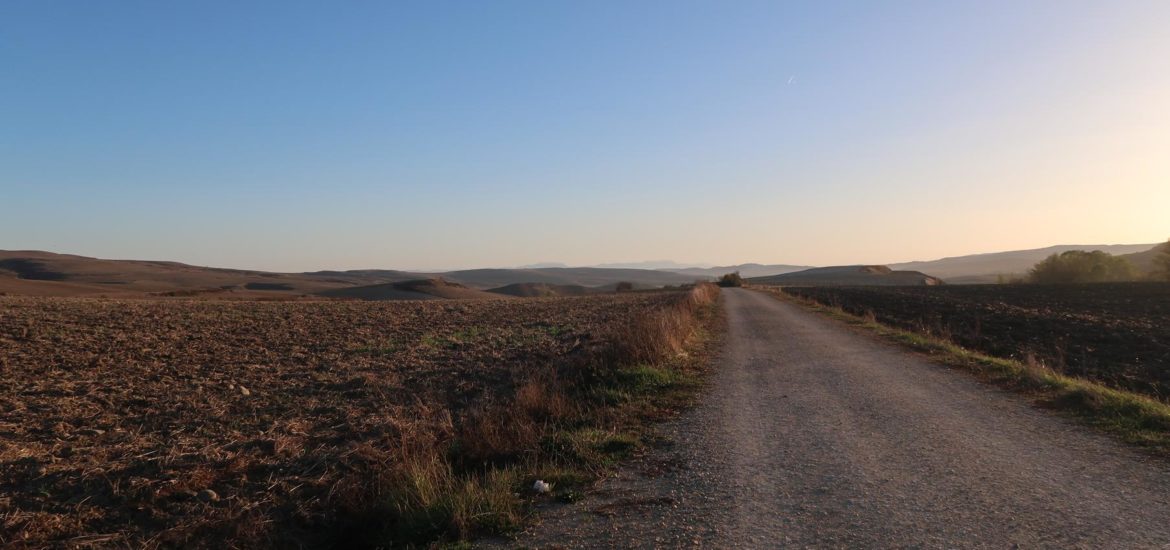I’ve been on the road for over two weeks now and am writing from Burgos, Castellia y Leon. Leaving home and all through France, the Camino de Santiago felt little more than a (scenic) bicycle route to me. This has changed considerably since I entered Spain and started tracking the much more popular Camino Frances. Even though the Sint Jacobs bicycle route developed by Clemens Sweerman only follows the Camino Frances loosely (sometimes making large detours to avoid busy roads), I still meet other pilgrims where both routes overlap and in the albergues. These meetings have been vital in growing my feeling of being a pilgrim on the Camino. Today (the 27th) I chose to follow the same trial as the hikers, which led to many more encounters with fellow pilgrims.
Most meetings are limited to short ‘Buen Camino!’ exchanges, others have been more meaningful. Leo, who I met after the difficult climb from Saint Jean Pied de Pont, is on his way from his home in das Schwarzwald to Santiago (and further to the Atlantic coast). It turns out he is actually Dutch, which meant I could talk Dutch after two weeks of French-only. Suhoon I met in the big Pamplona albergue. He is Korean, but currently resides in Singapore. Apparently walking the Camino is a popular ‘holiday’ in Korea, mostly for cultural reasons and not so much as a religious pilgrimage (I’ve discovered that there are many different reasons why pilgrims walk the Camino). Indeed the nature is stunning, the accommodation is very well built out (with lots of drinking fountains, shops and albergues every 5 to 15 kilometers) and the route is dotted with picturesque villages and cities with Roman, mid-evil and modern architecture and culture. Suhoon however is on a religious pilgrimage. I learned that Christianity is fairly large in Korea with more than 13 million Christians.
In the albergue in Belorado I met a 65 old french man from Nancy, who has been walking the Camino for nearly two months. He is retired and decided to walk the Camino as part of a spiritual sabbatical. I also met a 72 year old woman from Iceland, whose call name is Sita (Icelandic names are notoriously difficult to remember for outsiders) and who is on the camino for the second time. This time she intends to complete the section from Buergos to Santiago. Lucas was another interesting encounter who I’ll remember as the goofy Aussie with a guitar strapped to his pack (which he confirmed is not very practical). Taking a break from his employment in the financial sector, he is on the Camino to ponder about life.
This diversity of people of all ages and nations and different motivations for walking the Camino has surprised me and led to question my own motives for cycling the Camino. I always figured that most pilgrims follow the Camino for religious regions. As it turns out there there exist many different reasons: religion, spirituality, reflection, culture, hiking, finding a spouse (or so I was told :D). Initially the Camino appealed to me partly because Pieter, a former colleague, spoke so passionately about his Camino experience that his tale stuck with me. He spoke about the Camino feeling, about being part of group of pilgrims. As I was heading South anyway I figured, why not follow the Camino? It is indeed a beautiful route. Initially my experience has been very different than Pieter’s, this is mostly because I did not encounter any other pilgrims in France. Since the Camino Frances and the albergues, this has changed considerably. Meeting tens of pilgrims daily helps to instill this group feeling. Sometimes I do feel a bit guilty as I pass by pilgrims on my bicycle as I imagine that on foot the journey is more challenging.
So, why am I cycling my Camino? As a secular humanist it is obviously not for religious reasons. Spiritually, I find it enriching to find many friendly, positive people working towards the same goal. Feeling connected with all this diverse group of people has been immensely rewarding. After two weeks on the road I hit a rough patch, feeling along and homesick so far away from home. Here the Camino has helped me in connecting with others and overcoming that feeling. I’m looking forward to many more encounters in the days to come. The Camino also fits in my ambition to reflect on the past and to look at the future (e.g. what do I want to do next in life?) as part of my sabbatical. I’ve found that this does not come naturally to me and it requires a concentrated effort. I hope to grow in this regard by exchanging thoughts with others and brushing up on my reading. I have 80 000 hours on my reading list, but any other suggestions are welcomed!
Buen Camino!
Floris
